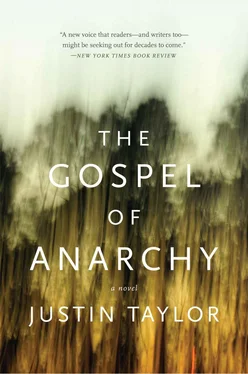But tonight is different from all other nights, because something has happened that he can’t explain. Katy’s never been a liar, but if there’s one thing he’s learned during his accidental fieldwork among the true believers, it’s that you can’t account for the lies people tell to themselves and then believe. If it had been Liz, he’d have said she made it up to please Katy, because that’s the kind of bug-eyed follower, pushy bottom that Liz is. Hell, even if it had been David — his old friend found then lost again so quickly this whirlwind week — he would have seen right through it. Wayward soul punch-drunk on double helpings of pussy, more than willing to play the mark in this dyke conspiracy, totally unconcerned with whatever the big picture is actually a picture of.
But Anchor wouldn’t let Katy put her up to something like this. She just wouldn’t. And even if she had — which she didn’t, because she wouldn’t — Thomas would know it, because Anchor has tried to lie to him before (about not coming from money, or where she was last night) and he can always tell. He doesn’t call her out, because they’re not into that kind of reproach and contest. Hell, they’re not even exclusive — just in love. And he gets why she wouldn’t want to share certain things. Liz is genuine working-class trash, as are Owl and Selah. (Katy and Parker he’s not sure about — their pasts are unknown to him, their respective personas cut from whole cloth. It would surprise him zero to learn that one of them was a trailer park brat and the other a Trustafarian; what he can’t decide is which one might be which.) But Thomas, David, Anchor — their parents don’t punch time clocks. They came to Gainesville through the VIP door, i.e., the college, and it’s a very hard thing to be fresh from that, or still partway in it, like Anchor is, and have to figure out how to look these truly fucked people in the eye and call yourself kin with them — brother, sister, ally — and not secretly believe you’re just a lifestyle tourist, an interloper, a piece of duplicitous shit like the girl in that rad Tilt song “Molly Coddled,” or that Pulp song “Common People,” the latter of course being too techno-ish to ever cop to having listened to, much less enjoyed, but still. Anyway, what’s the solution? All you can do is live in contradiction — a state of faith, basically — until the pressure sends you screaming back to campus or else the lie becomes true. As for Thomas it proudly has.
As for Anchor, he’s sure, it will.
So he knows that what Anchor says happened is what she really does think happened, though he hasn’t had a chance to actually talk to her, only listened in a little on them fawning over their dug-up book, then cranked his music up again to drown them out. Apparently Parker kept a diary, or something. Wonders truly do never cease. In any case, what actually happened may be — has, in fact, got to be — something else again from what they all seem to be claiming to each other (visions! prophecy!) but knowing that she isn’t lying is a start. He isn’t sure what kind of subconscious autosuggestive X-Files shit might be going on here, but he knows he’s never going to figure anything out sulking off by himself. Which is why he’s in the bathroom now, checking beneath the mostly dried pink paper towel to see what kind of condition his knuckles are in. The bleeding has stopped. That’s good. He tosses the towel in the trash, then goes back to his bedroom to get dressed for the evening service.
They come trickling through the wide back gate, not two by two like you’d imagine, but in ones and threes, clusters that seem somehow isolate, tripartite bodies straggling through the steam-close Floridian dark. They gather about the fire pit, flasks unsheathed from pockets, three or four rolling smokes from a communal pouch of shag. One kid wants to use the bathroom, and so breaks off, lets himself in through the kitchen door — nobody knocks here, nothing’s locked, everything is permitted — and Thomas takes a step aside, his back pressed against the fridge, out of the path of the kid’s ingress.
“Hi,” Thomas says.
“Oh hey,” says the kid. “I’m Aaron. Is it your first time here, too?”
“Yeah,” Thomas says. “You could say that.”
“Cool, man. Very cool. I’ve heard it’s like amazing and also like — kind of pretty fucked-up.”
“Weirder the better, right?”
“Fuckin’ A,” Aaron says, and then is onward again to the bathroom, except there’s already a line for the bathroom three people deep, so they’re backed up to the edge of the kitchen, so actually Aaron doesn’t go anywhere at all. He’s stuck right where he is. To keep things from getting awkward, and also because it was the original goal anyway, Thomas walks out through the still-open door.
Katy isn’t out here. She always stays secluded in her room for the hour or so before she goes on. Preparing, she says, emotionally and spiritually — meditating or jerking off or whatever it is she does. Thomas thinks the whole thing stinks of theater, though on this day of all days it makes a kind of sense. Probably she’s holed up with the precious Book of Parker, poring over its rambling pages, fretting how there’s hardly enough time to cobble together anything like a coherent homily — not that her regular homilies are anything close to coherent, in the traditional sense of that word. Though in fairness, that’s an assumption; he’s never bothered to sit through one since they’ve moved here. Perhaps she’s gotten better — it’s possible — though the next thing that occurs to him is: better at what?
He walks through the crowd of kids, counting heads and, at the same time, familiar faces. He figures about fifteen attendees, including the handful inside. But that’s not counting Owl and Selah, who are here because they know there’ll be food after and are too polite to hide out in their van until it’s served. Besides which, as hippies, they have a basically limitless capacity for suffering bullshit. In fact, except for the blessed absence of heroin, they’re kind of collectively Drake the junkie all over again.
Thomas is also not counting himself, or any of the other housemates. So the total number of people present is higher — probably twenty or twenty-two.
Of the nonresidents assembled, figure about three quarters of them are friends, or at least faces he knows from the scene. People he’s done sound for, served food, or had to for whatever reason forcibly eject from some show. These are the ones he walks past, wordless, nodding curtly back at the ones who acknowledge him, which are several. And why not? In a tight scene like theirs in a small town like this, he’s basically a celebrity, only half a rung down from the local gods who are actually in bands.
Thomas is headed toward the tent where, apart from the group, stand Anchor and Liz. The girls are not talking, or even looking at one another. Each has her attention focused on an object — Liz on the shade-drawn window of her and Katy’s and David’s bedroom; Anchor on the dull dumb tent, restored immediately after the excavation project to its exact original plot. The general congregation might as well not even be here. Ah, elders and acolytes, you can see it already, how they’re just like every other sicko cult in history. At least that’s how it looks to Thomas, but then again, it’s early yet. Barely past nine o’clock.
The girls register his presence more or less at the same time. Anchor breaks out this grin that lights her whole face up like a jack-o’-lantern. Liz, however, has the opposite reaction; there are storms out on the waters in her flashing eyes, and she steps forward, boldly putting her body between the tent and Thomas, as if she expects him to attack it — as if she thinks she can stop him if he does.
Читать дальше












